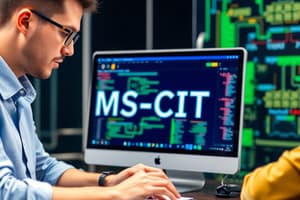Podcast
Questions and Answers
MScIT ના પ્રથમ સેમેસ્ટરમાં કયા વિષયની શરૂઆતના મૂળભૂત તત્વો સમાવેશ થાય છે?
MScIT ના પ્રથમ સેમેસ્ટરમાં કયા વિષયની શરૂઆતના મૂળભૂત તત્વો સમાવેશ થાય છે?
- મેડિકલ ઈન્ફોર્મેટિક્સ
- મેટ્રિક્સ થિઓરી
- ભાષા શિક્ષણ
- કમ્પ્યુટર આર્કિટેક્ચર (correct)
ડેટાબેઝ મેનેજમેન્ટ સિસ્ટમમાં SQL નો મુખ્ય ઉપયોગ શું છે?
ડેટાબેઝ મેનેજમેન્ટ સિસ્ટમમાં SQL નો મુખ્ય ઉપયોગ શું છે?
- નેટવર્ક સિક્યુરિટી
- પીટીઆઈ મેનેજમેન્ટ
- ડેટા ક્વેરી અને મેનિપ્યુલેશન (correct)
- વેબ ડિસ્ટ્રીબ્યુશન
સોફ્ટવેર એન્જિનિયરિંગની મૂળભૂત પદ્ધતિઓમાં કઈ પદ્ધતિઓનો સમાવેશ થાય છે?
સોફ્ટવેર એન્જિનિયરિંગની મૂળભૂત પદ્ધતિઓમાં કઈ પદ્ધતિઓનો સમાવેશ થાય છે?
- અગ્ણિશામક અને ફાયરફાઇટર
- એજાઇલ અને વોટરફાલ (correct)
- વોટરફોલ અને એલ્ગોરિથમ
- સિસ્ટેમ એપ્લિકેશન અને ડેટા એસ્સેમેન્ટ
મૈથમેટિક્સ ફોર કમ્પ્યુટિંગ કોર્સમાં કયા મુદ્દાઓની ચર્ચા થાય છે?
મૈથમેટિક્સ ફોર કમ્પ્યુટિંગ કોર્સમાં કયા મુદ્દાઓની ચર્ચા થાય છે?
કમ્પ્યુટર નિયમન અને સંચાલન સંબંધિત કયા મુદ્દા Fundamentals of Computing ના ભાગરૂપે સમાવેશ થાય છે?
કમ્પ્યુટર નિયમન અને સંચાલન સંબંધિત કયા મુદ્દા Fundamentals of Computing ના ભાગરૂપે સમાવેશ થાય છે?
મુલભૂત નેટવર્કિંગમાં કઈ તત્વોને આવરી લેવામાં આવે છે?
મુલભૂત નેટવર્કિંગમાં કઈ તત્વોને આવરી લેવામાં આવે છે?
સાઇબર સિક્યુરિટી અને ખાતરી શાખામાં કયા મુદ્દાઓનો સમાવેશ થાય છે?
સાઇબર સિક્યુરિટી અને ખાતરી શાખામાં કયા મુદ્દાઓનો સમાવેશ થાય છે?
MScIT પ્રોગ્રામમાં કઈ ઇલેક્ટિવમાં નિષ્ણાતોના વહેવારોનું પ્રદાન થાય છે?
MScIT પ્રોગ્રામમાં કઈ ઇલેક્ટિવમાં નિષ્ણાતોના વહેવારોનું પ્રદાન થાય છે?
Flashcards
MScIT
MScIT
Master of Science in Information Technology, a postgraduate degree focusing on IT theory and practice.
Sem1 IT
Sem1 IT
First semester of MScIT, covering foundational IT concepts and introductory specializations.
Fundamentals of Computing
Fundamentals of Computing
Core IT module covering computer architecture, operating systems, data structures, algorithms, and programming.
DBMS
DBMS
Signup and view all the flashcards
Network security
Network security
Signup and view all the flashcards
Software Engineering
Software Engineering
Signup and view all the flashcards
Elective Modules
Elective Modules
Signup and view all the flashcards
Cloud Computing
Cloud Computing
Signup and view all the flashcards
Study Notes
Introduction to MScIT
- MScIT stands for Master of Science in Information Technology
- It is a postgraduate degree program focused on the theoretical and practical aspects of information technology
- The first semester (Sem1) typically covers foundational concepts and introductory specializations within the field of IT
- The topics covered may vary depending on the specific curriculum and the university offering the program
Core Modules (Likely Examples)
- Fundamentals of Computing:
- Introduction to computer architecture and organization
- Operating systems, including their functions and management
- Data structures and algorithms, their application, and efficiency analyses
- Programming languages and their use cases
- Data representation and encoding methods
- Database Management Systems (DBMS):
- Relational database design and implementation
- SQL (Structured Query Language) for querying and manipulating data
- Database normalization and integrity constraints
- Transaction management and concurrency control in databases
- Introduction to Networking:
- Network topologies and protocols
- Network security concepts and threats
- Network devices and their functions
- Internet protocols and their operation
- Basic network administration
- Software Engineering Fundamentals:
- Software development methodologies (e.g., Agile, Waterfall)
- Software design principles and best practices
- Software testing and quality assurance
- Software project management basics
- Information Security and Assurance:
- Cybersecurity threats and vulnerabilities
- Security policies and procedures
- Risk assessment and mitigation strategies
- Access control mechanisms and user authentication
- Encryption and decryption techniques
- Mathematics for Computing:
- Relevant mathematical concepts essential for IT-related studies
- Statistics, probability, and mathematical modeling
- Computational methods and numerical analysis
Possible Elective Modules (Likely Examples)
- Depending on the program, some introductory specialized electives might be offered in the first semester
- Examples might include:
- Web development technologies
- Mobile application development
- Cloud computing principles
- Data warehousing and data mining
- Cybersecurity tools and analysis techniques
- These electives often provide foundational knowledge for future specialization areas.
General Expectations for Sem1
- Students can expect a balance of theoretical and practical learning.
- Emphasis on fundamental concepts that underpin more advanced topics in later semesters.
- Significant coursework to be completed, including assignments and possibly introductory projects.
- Strong focus on developing and applying problem-solving skills.
- Possible exposure to current trends and technologies within the IT industry.
Assessment Methods (Likely Examples)
- Assessment methods vary, but are usually a combination of:
- Exams (midterm and final)
- Assignments (involving coding, database design, report writing, etc.)
- Coursework assessments (e.g., presentations, small research projects)
- Practical/Lab work to apply theoretical knowledge.
Studying That Suits You
Use AI to generate personalized quizzes and flashcards to suit your learning preferences.




